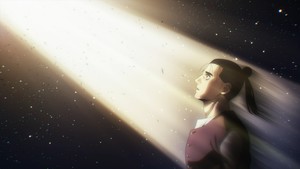Orb: On the Movements of the Earth
Episode 9
by Steve Jones,
How would you rate episode 9 of
Orb: On the Movements of the Earth ?
Community score: 4.6

It should come as no surprise that I've been enjoying Orb a lot so far. I haven't been shy about saying so in my reviews. However, this week's episode is the first one to completely and emotionally floor me. It's a stellar microcosm of everything the show has built, and it delivers its punches with appropriate allocations of drama and intellectual heft. It's a fantastic episode—the best one yet. And we're not even halfway through this story, which makes me all the more excited for what is yet to come.
Piast is such a tragic figure, because he experiences his tragedy from both sides. In the flashback, he becomes his mentor's star pupil and gains access to the reams and reams of research in his archive. However, the lone candle illuminating the large and mostly dark room brings to mind the limits of human observation and experience, especially at the time. Piast himself comes face-to-face with that limit when he catches a glimpse of Venus in its final phase, and when he refuses to acknowledge it, both for his sake and the sake of his professor. We understand his motivations, but at that moment, he fails as a scientist. It becomes the next generation's duty to see what he couldn't.
But we know this story. We know why it took so long for the world to accept heliocentrism. Orb's most important contribution to this narrative is the drama—the small, human moments that evaporate in a blink of the cosmic eye. Piast, sitting by his mentor's deathbed, calls him an inadequate astronomer because that's kinder than acknowledging that his life's work was the pursuit of a mirage. It's a devastating scene, and it's an important one. In a science textbook, you might see various examples of the convoluted geocentric models that people came up with during the dark ages, but you don't see the tears shed over them. Piast's brain isn't any different from ours. He could verify the fallacies and frustrations of any geocentric model, but the times simply wouldn't allow him to take that next leap of logic. His lack of courage isn't his fault. Courage should not have even entered into the study of the cosmos.
In that manner, the timeliness of Orb's story hits especially hard this week. Although the technological advances of the last century may have led us to conclude otherwise, the history of scientific progression isn't a straight and skyward line. There are dips. There are missing chunks. Science, like any human endeavor, isn't an island. It's a product of its environment, and I fear our current environment is only going to get more hostile. Political leaders worldwide plug their ears when confronted with climate science. The incoming Trump administration is already populating itself with quacks and kooks who have regressive views on basically every branch of science I can think of, and there's no telling what they'll censor or outlaw. Truth is a precarious thing. It may be immutable, but humans aren't.
That's why Jolenta's words to Oczy feel so powerful. In general, I love the way their friendship develops this week, and, despite Badeni's dismissal of her, I hope she sticks around to teach Oczy to read and write. But specifically, I love her phrasing: “our lives are trapped, beyond our control, in this day and age.” I know exactly what she means. Moreover, she follows up with a succinct and heartfelt summary of Orb's core thesis. No matter how much things suck right now, as long as we can read, we can converse with the past, and as long as we can write, we can leave a legacy for the future. That's the realest miracle there is. It's the reason you're reading these words right now instead of foraging for nuts and berries. It's the salvation for Piast, his mentor, and the grand litany of scientists throughout history who have been dead wrong. They're all links in the chain that leads us to a better understanding of the universe. And that, hopefully, gives us better, more informed opportunities to be kinder to it and each other.
The other story Orb tells is best told through Oczy. He is not a scientist. He's just a guy with great eyes. Nevertheless, he's instrumental (quite literally) to their dismissal of the geocentric model this week. He's their substitute telescope. In doing so, though, he also discovers the pleasure and power of learning something that is true. It's a moment this adaptation handles wonderfully. Orb's embellishments never let us forget the depth of its human drama. A small yellow circle at dusk shatters the whole world for the man observing it. That's what Orb truly means when its characters talk about the Earth moving. It's not merely in the literal sense. They are revolutionizing it from the inside as it makes its own orbital revolution around the sun. They're forging an environment in which Piast wouldn't have to wait for the afterlife to properly discuss the cosmos with his old friend. A better world is always possible.
Rating:
Orb: On the Movements of the Earth is currently streaming on Netflix.
Steve is on Bluesky now, and he's okay with that. He is busy pondering the orb. You can also catch him chatting about trash and treasure alike on This Week in Anime.
discuss this in the forum (60 posts) |
back to Orb: On the Movements of the Earth
Episode Review homepage / archives